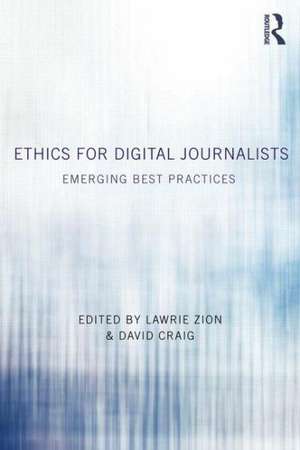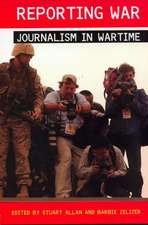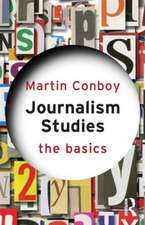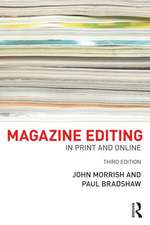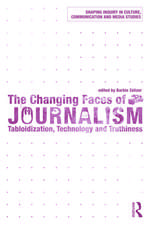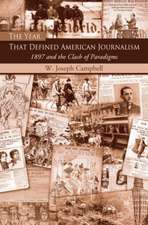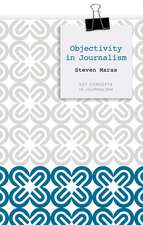Ethics for Digital Journalists: Emerging Best Practices
Editat de Lawrie Zion, David Craigen Limba Engleză Paperback – 19 sep 2014
In Ethics for Digital Journalists, Lawrie Zion and David Craig draw together the international expertise and experience of journalists and scholars who have all been part of the process of shaping best practices in digital journalism. Drawing on contemporary events and controversies like the Boston Marathon bombing and the Arab Spring, the authors examine emerging best practices in everything from transparency and verification to aggregation, collaboration, live blogging, tweeting and the challenges of digital narratives. At a time when questions of ethics and practice are challenged and subject to intense debate, this book is designed to provide students and practitioners with the insights and skills to realize their potential as professionals.
| Toate formatele și edițiile | Preț | Express |
|---|---|---|
| Paperback (1) | 417.42 lei 43-57 zile | |
| Taylor & Francis – 19 sep 2014 | 417.42 lei 43-57 zile | |
| Hardback (1) | 1109.99 lei 43-57 zile | |
| Taylor & Francis – 18 sep 2014 | 1109.99 lei 43-57 zile |
Preț: 417.42 lei
Nou
Puncte Express: 626
Preț estimativ în valută:
79.88€ • 83.09$ • 65.95£
79.88€ • 83.09$ • 65.95£
Carte tipărită la comandă
Livrare economică 14-28 aprilie
Preluare comenzi: 021 569.72.76
Specificații
ISBN-13: 9780415858854
ISBN-10: 0415858852
Pagini: 240
Ilustrații: 10 black & white halftones
Dimensiuni: 152 x 229 x 13 mm
Greutate: 0.33 kg
Ediția:New.
Editura: Taylor & Francis
Colecția Routledge
Locul publicării:Oxford, United Kingdom
ISBN-10: 0415858852
Pagini: 240
Ilustrații: 10 black & white halftones
Dimensiuni: 152 x 229 x 13 mm
Greutate: 0.33 kg
Ediția:New.
Editura: Taylor & Francis
Colecția Routledge
Locul publicării:Oxford, United Kingdom
Public țintă
Postgraduate, Professional, and UndergraduateCuprins
1. Why Best Practices? Lawrie Zion 2. Journalism Ethics and Best Practices David Craig 3. Best Practices in the Network Journalism Sphere Ansgard Heinrich 4. The Magical Concept of Transparency Stephen J. A. Ward 5. Filtering Fact from Fiction: A Verification Framework for Social Media Alfred Hermida 6. Best Practices for Linking Juliette De Maeyer 7. The Case for Curatorial Journalism ... or, Can You Really Be an Ethical Aggregator? Fiona Martin 8. Real-time Online Reporting: Best Practices for Live Blogging Neil Thurman 9. Live-Tweeting: The Rise of Real-time Reporting Jonathan Hewett 10. Handling Mistakes: Corrections and Unpublishing Tim Currie 11. Collaboration Lily Canter 12. Fostering and Moderating Citizen Conversations David Domingo 13. "These Views Are My Own": The Private and Public Self in the Digital Media Sphere Kelly Fincham 14. Multimedia Journalism Mindy McAdams 15. Data Journalism Paul Bradshaw
Notă biografică
Lawrie Zion is an Associate Professor of Journalism at La Trobe University in Melbourne, Australia, and editor-in-chief of upstart magazine. He has worked as a broadcaster with the Australian Broadcasting Corporation and as a film journalist for a range of print publications. He wrote and researched the 2007 documentary The Sounds of Aus, which tells the story of the Australian accent.
David Craig is a Professor of Journalism and Associate Dean at the University of Oklahoma in the United States. He is the author of Excellence in Online Journalism: Exploring Current Practices in an Evolving Environment and The Ethics of the Story: Using Narrative Techniques Responsibly in Journalism.
David Craig is a Professor of Journalism and Associate Dean at the University of Oklahoma in the United States. He is the author of Excellence in Online Journalism: Exploring Current Practices in an Evolving Environment and The Ethics of the Story: Using Narrative Techniques Responsibly in Journalism.
Recenzii
"The essays in this collection cover best practices in an era of networked, global journalism; the role of transparency in relation to other journalistic values; verification practices for social media; principles of linking; curation and aggregation; live blogging and tweeting; corrections and "unpublishing"; citizen collaboration; multimedia journalism; data journalism; and issues related to journalists' public and private selves. The essays are tightly integrated through attention to three key ethical frameworks: duty, virtue, and care. Case studies of best practices and questions for reflection offer opportunities for application. …. Summing Up: Highly recommended." —J. H. Fritz, Duquesne University, for CHOICE
"The best of the emergent literature on online journalism combines the applied and the theoretical, allowing readers to see the connections between abstract and concrete principles. By grounding the book in best practices, and by turning to a veritable who’s who of commentators to examine the state of the art across so many aspects of online journalism, the editors assemble a timely, useful book of interest to practitioners, teachers and students. Zion and Craig, seasoned journalists as well as academics, walk the walk, and hence can talk the talk." —Charles N. Davis, Dean, Henry W. Grady College of Journalism and Mass Communication, University of Georgia
"The best of the emergent literature on online journalism combines the applied and the theoretical, allowing readers to see the connections between abstract and concrete principles. By grounding the book in best practices, and by turning to a veritable who’s who of commentators to examine the state of the art across so many aspects of online journalism, the editors assemble a timely, useful book of interest to practitioners, teachers and students. Zion and Craig, seasoned journalists as well as academics, walk the walk, and hence can talk the talk." —Charles N. Davis, Dean, Henry W. Grady College of Journalism and Mass Communication, University of Georgia
Descriere
The rapid growth of online media has led to new complications in journalism ethics and practice. While traditional ethical principles may not fundamentally change when information is disseminated online, applying them across platforms has become more challenging as new kinds of interactions develop between journalists and audiences.
In Ethics for Digital Journalists, Lawrie Zion and David Craig draw together the international expertise and experience of journalists and scholars who have all been part of the process of shaping best practices in digital journalism. Drawing on contemporary events and controversies like the Boston Marathon bombing and the Arab Spring, the authors examine emerging best practices in everything from transparency and verification to aggregation, collaboration, live blogging, tweeting and the challenges of digital narratives. At a time when questions of ethics and practice are challenged and subject to intense debate, this book is designed to provide students and practitioners with the insights and skills to realize their potential as professionals.
In Ethics for Digital Journalists, Lawrie Zion and David Craig draw together the international expertise and experience of journalists and scholars who have all been part of the process of shaping best practices in digital journalism. Drawing on contemporary events and controversies like the Boston Marathon bombing and the Arab Spring, the authors examine emerging best practices in everything from transparency and verification to aggregation, collaboration, live blogging, tweeting and the challenges of digital narratives. At a time when questions of ethics and practice are challenged and subject to intense debate, this book is designed to provide students and practitioners with the insights and skills to realize their potential as professionals.
